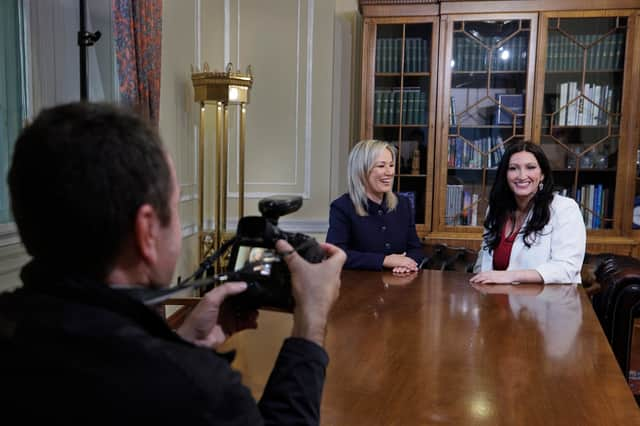Michelle O'Neill & Emma Little-Pengelly: The women now leading the Northern Ireland Assembly
and live on Freeview channel 276
This week, Michelle O'Neill became the first nationalist first minister of Northern Ireland. As the devolved government returned on Saturday (February 3) for the first time in two years, the 47-year-old was sworn into the role, telling Stormont it was a "historic day".
O'Neill is the deputy president of Sinn Féin, the nationalist party that won the largest number of seats at the 2022 Assembly election, making her the default choice as first minister. However the Democratic Unionist Party (DUP), which had provided all previous first ministers, refused to nominate a deputy due to ongoing objections to the UK Government's Brexit deal.
Advertisement
Hide AdAdvertisement
Hide AdNow, with the DUP returning to power sharing after reaching an agreement with Westminster, O'Neill has been sworn in to the role. The deputy first minister, from the DUP, is Emma Little-Pengelly.
During the swearing in ceremony, O'Neill leading with a reconciliatory theme, said: "This is an historic day which represents a new dawn. I will serve everyone equally and be a First Minister for all. I am sorry for all the lives lost during the conflict without exception."


Who is first minister Michelle O'Neill?
Born in Fermoy, County Cork in 1977 - at the height of Troubles - O'Neill is the daughter of Brendan Doris, who served time in prison as a member of the Provisional IRA and later became a Sinn Féin councillor.
After becoming a mother at 16, O'Neill joined Sinn Féin in 1998, after the signing of the Good Friday Agreement. She was elected to Dungannon and South Tyrone Borough Council in 2005, taking the seat vacated by her father.
Advertisement
Hide AdAdvertisement
Hide AdThen, in 2007, she was elected to the Assembly, representing Mid Ulster for Sinn Féin, but retained her seat on the council. In 2010, she became mayor of Dungannon and South Tyrone - the first woman to do so - before resigning her seat in 2011.
Having served as a Minister for Agriculture and Rural Development, as well as Minister of Heath, in January 2017 she was picked as leader of the party in the north, replacing Martin McGuinness after his resignation. She was appointed deputy first minister in 2020, and assumed the first minister role after Sinn Féin's victory in 2022, finally taking up the role two years later.
She has hit the headlines over the years for remarks regarding both Brexit and the reunification of Ireland. In 2017, in the aftermath of the EU referendum result, O'Neill called for a poll to be taken on Irish unity "as soon as possible". She also said Brexit would be "a disaster" for Ireland.
And last year, she sued DUP councillor John Carson over social media remarks made about her in April 2021. She won the case, and Carson apologised for what the court called an "abusive, highly offensive and misogynistic" comment.
Advertisement
Hide AdAdvertisement
Hide AdAfter the death of the Queen, in a break from republican tradition, she attended the funeral. And in May last year, O'Neill also attended the coronation of King Charles III.
"We live in changing times and it was the respectful thing to do, to show respect and to be here for all those people at home, who I had said I would be a first minister for all," she said. "Attendance here is about honouring that and fulfilling my promise."
O'Neill became a grandmother in 2023, having separated from her husband, Paddy O'Neill, in 2014.
Who is deputy first minster Emma Little-Pengelly?
Born just under a year after new first minister Michelle O'Neill, Little-Pengelly shares more in common with her colleague than their year of birth. Her father, like O'Neill's, was a member of a paramilitary organisation - the Ulster Resistance - and a former UDR (Ulster Defence Regiment) soldier.
Advertisement
Hide AdAdvertisement
Hide AdHowever, Little-Pengelly was able to pursue an academic course, completing a degree at Queen's University Belfast and qualifying as a barrister in 2003. Her political career began in 2007, when she was appointed a special adviser to then-first minister, Rev Ian Paisley. She remained in the role under first minister Peter Robinson, before leaving in 2015.
That year, the 47-year-old became the MLA for Belfast South but lost her seat in 2017. However, after losing, she ran for the Belfast South seat in the UK Parliament, and was elected at the 2017 general election, before again being unseated in 2019.
Again, this proved a short-term setback, as Little-Pengelly was co-opted to DUP leader Jeffrey Donaldson's seat in Stormont when he refused to take it, in opposition to the UK Government's Brexit deal.
Now, she has been sworn in as deputy first leader, becoming the first unionist to occupy the position. She is married to Richard Pengelly, permanent secretary at the Department of Justice in Northern Ireland.
Despite their obvious differences, whether these two women can use what they have in common to reconcile the past and forge a 'new dawn' at Stormont now remains to be seen.
Comment Guidelines
National World encourages reader discussion on our stories. User feedback, insights and back-and-forth exchanges add a rich layer of context to reporting. Please review our Community Guidelines before commenting.
